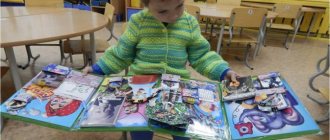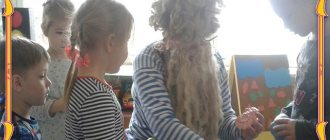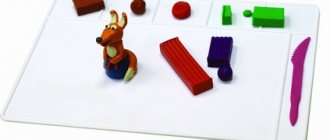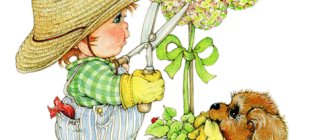Selection of topics taking into account the experience of the teaching staff
When determining the path of his own development, the educator must focus on his experience and acquired knowledge. Based on this, specialists with different levels of training should choose those areas that they can handle. For example, the topic of pedagogical advice is close and accessible to the senior teacher of a preschool institution. This is a person not only with excellent specialized training, but also with significant experience in practical work, in particular, methodological work. Consequently, on the chosen topic, he can give his colleagues a lot of useful and important information, share his own knowledge and experience, and competently organize the methodological work of the preschool educational institution.
A young specialist who has recently graduated from an educational institution has excellent theoretical knowledge and very little practical experience. Therefore, it is logical for him to choose a direction related to his level of training, for example, to write a micro essay on the topic of the teaching profession of a teacher. His experience is quite sufficient to perform such a task at a very high level.
Also, for beginning educators it is proposed to focus on the following areas:
- Nurturing the personality in every child is a priority of education.
- Development of your pedagogical skills, abilities and skills in working with children of different ages.
- Consolidation of previously acquired theoretical knowledge.
A teacher with more than 5 years of experience can already choose more complex goals and objectives for himself, for example, taking the teaching activity of a teacher in its various aspects as the topic of coursework. He has access to the design of the educational process in preschool educational institutions, a creative approach to the education and training of preschool children, the ability to analyze and use educational and methodological literature and sources in his work.
The topic of a teacher’s pedagogical experience on speech development among kindergarten students can be chosen either by a specialized specialist - a speech therapist or speech pathologist, or by another teaching worker who pays attention to this particular problem.
The concept of self-education: goals and forms
The very specifics of a teacher’s work, aimed at the upbringing and development of children, obliges him to constantly engage in a creative search for non-standard solutions, self-education, and improvement of professional skills, as well as personal qualities. A good specialist cannot be passive: competence and initiative are required of him every day.
In addition, the level of proficiency in topics and plans in accordance with the Federal State Educational Standards (federal state educational standards) directly affects the competence, qualifications and even monetary remuneration of a specialist. We should not forget that parents, when choosing an educational institution that can provide optimal conditions for the development of their child, are primarily interested in the level of creative activity and professionalism of the teachers working there.
The need for self-education is a characteristic quality of a developed personality, a necessary element of its spiritual life. Considered the highest form of satisfying the cognitive needs of an individual, self-education is associated with the manifestation of significant volitional efforts, a high degree of consciousness and organization of a person, and the assumption of internal responsibility for one’s self-improvement.
G. M. Kodzhaspirova, A. Yu. Kodzhaspirov
"Pedagogical Dictionary"
Goals and directions of work
A necessary condition for improving the work of a preschool institution is the organization of advisory assistance to educators who have encountered any problem in their work with children or are seeking to master more effective teaching methods. A senior teacher or methodologist will give wise advice and suggest practical methods for solving the issue that has arisen, but the success of the work done will depend decisively on the initiative and interest of the teacher himself, his personal efforts and desire to develop.
The work of a teacher requires constant expansion of knowledge and skillset
Self-education is a conscious, active cognitive and creative activity of a teacher, aimed at enriching his professional knowledge and improving methodological techniques for working with children that correspond to the modern level of development of pedagogy and psychology. Outdated working methods can hinder the harmonious development of the modern generation of children. The teacher purposefully plans for him to master during the school year a thematic area that causes him professional difficulties or represents an issue of deep interest.
It is important to approach the issue creatively, to show imagination - only then will the lesson be effective and interesting for kids
The main areas of work to improve professional competence:
- awareness of innovations in the base of regulatory documentation related to the preschool educational level;
- familiarization with educational literature and methodological recommendations;
- awareness of the latest scientific achievements in the field of pedagogical thought, developmental psychology and child physiology;
- studying modern comprehensive and partial programs, the latest pedagogical technologies, proprietary methods, as well as the best practices of other preschool institutions;
- qualitative expansion of personal educational horizons, improvement of general cultural level.
Forms of self-education
Forms of self-education include the following types of activities:
- working with the library collection, reading special periodicals, monographs, creating your own thematic card index;
- fruitful work with other teachers in the framework of methodological seminars, scientific conferences, psychological trainings;
- seeking professional advice at educational centers for retraining and advanced training, at specialized departments of higher educational institutions;
- cooperation with the regional information center for psychological, diagnostic and developmental techniques.
The head of a preschool organization is faced with the task of creating a creative atmosphere that would encourage each teacher to self-education, awaken the desire to create, search, experiment, learn and help others. In the methodological corner, the senior teacher completes a fund of specialized literature to help educators:
- periodicals are systematized by year of publication and thematic collections;
- Each book from the library catalog is accompanied by an additional annotation with a list of issues that are considered by the author.
In our work, it is extremely important to introduce pedagogical innovations in order to raise a generation that meets the modern requirements of society
A senior educator, due to his experience and competence, can provide his less experienced colleague with the following methodological and advisory assistance:
- determine the topic, specify goals and objectives;
- plan your self-education work;
- competently present current information on the progress of planned events (games, classes, excursions, holidays, etc.) and actions (studying literature, consulting work with parents, preparing presentations and participating in practical seminars);
- summarize, analyze the qualitative and quantitative indicators of the work done.
Planned professional development of teachers takes place every five years in special courses, and in the period between courses, the independent work of each teacher, carried out under the patronage of a senior teacher or methodologist of a preschool educational organization, becomes relevant. Self-education of a teacher in a preschool educational institution must necessarily include the exchange of experience with other colleagues on issues of education and training, and the organization of the pedagogical process.
Key aspects of self-education
Teacher self-education activities can be divided into certain periods to simplify planning and subsequent analysis.
Table: structural content of self-education for kindergarten teachers
| Periods of activity | Teacher's actions | Area of competence of the senior educator/methodologist |
| Preparatory and diagnostic | Awareness of internal motivation for self-education, the need to expand professional horizons and areas of competence, defining goals and objectives. | Diagnostic research and multifaceted analysis of the teacher’s activities. Conducting an individual conversation and questionnaire in order to identify the range of professional interests, creative abilities and inclinations. |
| Planning | Selecting a topic, identifying important aspects, indicating the main stages, forms and methods of work, drawing up a long-term work plan. | Consulting and methodological support on issues that arise, depending on the experience and qualifications of the teacher. |
| Educational activities | Acquaintance with theoretical aspects and study of methodological literature on the selected problem. | Selection of educational and methodological literature, video recordings of master classes and classes, design of a thematic stand and exhibition with visual material. |
| Practical activities | Preparing and conducting classes, games, projects with children, producing additional teaching aids. | Attending classes, diagnosing and assessing the practical experience of the teacher. |
| Summarizing | Filling out a workbook about the theoretical preparation done and practical implementation experience, a report folder with data on the dynamics of children's results, organizing an exhibition of children's works, conducting a creative report or presentation. Final report at the pedagogical council, methodological seminar, conference for the exchange of experience. | Advisory assistance in documenting the results of the work done, replenishment of the information bank of methodological manuals. |
Tips for organizing self-education:
- it is advisable to have a special workbook and write down in it the most important innovative proposals of various educational methods, including proprietary ones;
- it is advisable to choose topics that will have practical implementation and will help in solving a real educational or educational problem;
- self-education involves forming your own judgments on a particular topic, so it is important to learn how to comprehensively analyze the issue being studied;
- In order to timely identify gaps in your own knowledge and adjust your actions, you need to seek advice and help from your colleagues.
Photo gallery: design of a self-education workbook (example)
Cover
The topic must be specified
Justification of the relevance of the topic, goal setting
Work plan for September
Work plan for October
Work plan for November
Work plan for December
Work plan for January
Work plan for February
Work plan for March
Work plan for April
Work plan for May
Bibliography
Senior group. Senior preschool age. Children 5-6 years old
Generalization of work experience. Speech creativity of children (senior preschool age) The speech of preschool children is constantly developing. At an early age, children are just mastering speech, memorizing words and comprehending their meaning, appropriating and beginning to use speech patterns that they hear from others. At older preschool age we can already talk about...
Generalization of work experience “Local history as a means of educating children of senior preschool age” SLIDE 1 Hello, dear colleagues! Allow me to introduce myself, Alena Aleksandrovna Milova, teacher of the municipal budgetary preschool educational institution “Kindergarten No. 47”
. The topic of my report is “Local history as a means of educating senior preschool children...




